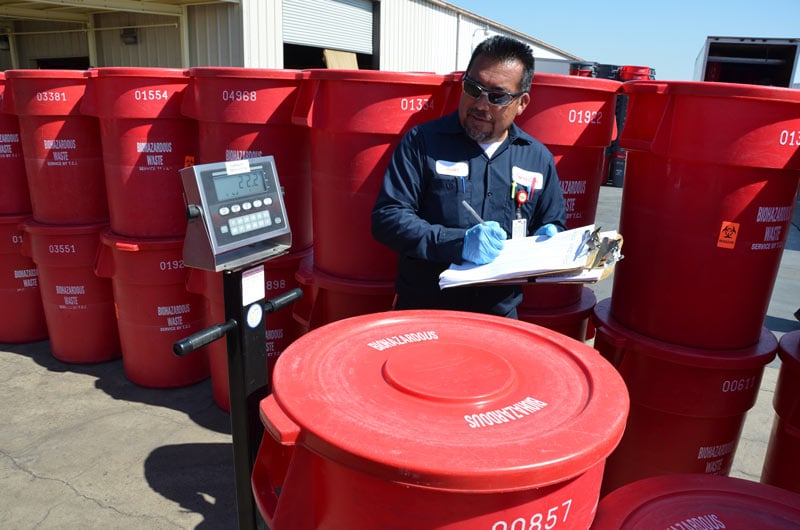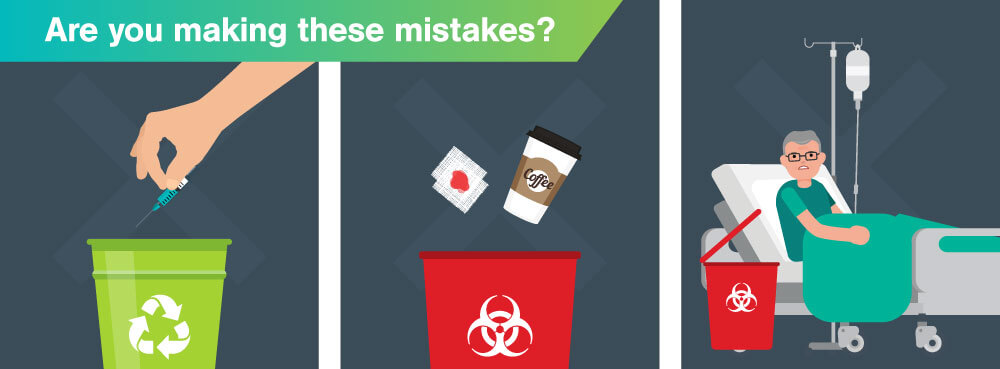Turnkey Medical Waste Removal Service: Smooth Disposal for Medical Care Facilities
Wiki Article
Making Sure Safe Handling and Disposal of Medical Waste
Making certain safe handling and disposal of clinical waste is of critical relevance in healthcare settings. Incorrect management of medical waste can pose substantial threats to the setting, public health and wellness, and health care employees. This demands adherence to rigorous guidelines and protocols for its risk-free handling and disposal. In this intro, we will certainly explore the relevance of appropriate clinical waste monitoring, the dangers related to improper handling and disposal, as well as the guidelines and strategies that can be applied to guarantee its secure disposal. Additionally, we will discuss the importance of training and education for healthcare professionals in order to maintain a secure and tidy healthcare setting. By adhering to these techniques, we can effectively minimize the possible dangers related to medical waste.Relevance of Correct Medical Waste Monitoring
Proper medical waste administration is of utmost significance in ensuring the safety and security and wellness of medical care experts, patients, and the basic public. Medical waste describes any waste created by health care facilities throughout the diagnosis, therapy, or immunization of animals or human beings. This waste can pose severe wellness dangers otherwise managed and gotten rid of effectively.
Among the key reasons why appropriate clinical waste management is critical is to avoid the spread of transmittable conditions. Medical waste, such as utilized needles, infected dressings, and biological products, can carry harmful microorganisms. If not handled and gotten rid of properly, these microorganisms can be sent to medical care workers, patients, waste trainers, and even the basic public, causing the possible episode of illness.
In addition, correct medical waste management helps secure the environment - medical waste removal service. Medical waste has dangerous materials, consisting of chemicals, pharmaceuticals, and radioactive materials. When not handled suitably, these materials can pollute dirt, water bodies, and the air, posing a significant threat to ecological communities and public wellness
In addition, reliable clinical waste administration makes certain conformity with international standards and neighborhood regulations. Governments and governing bodies have actually established procedures and guidelines to make sure the safe handling, storage space, transport, and disposal of clinical waste. Sticking to these regulations is vital to prevent legal consequences and maintain the reputation and reliability of medical care centers.
Dangers of Improper Handling and Disposal

If medical waste is not properly disposed of,Clients can additionally be subjected to these infectious illness. As an example, if infected needles or other sharps are not thrown away in marked puncture-proof containers, they might unintentionally prick clients, causing prospective infections. In addition, if medical waste is not segregated properly, there is a threat of cross-contamination in between various sorts of waste, additional enhancing the chances of disease transmission.
Improper disposal of medical waste can likewise have damaging effects on the environment and the public. If medical waste is not treated and dealt with properly, it can contaminate water resources, dirt, and air, causing the spread of contaminants and diseases. This can have lasting repercussions on ecological communities and public wellness.
Standards for Safe Handling of Medical Waste
Executing effective methods for the secure handling of medical waste is essential in ensuring the defense of healthcare specialists, individuals, and the public. These standards are crucial in lessening the risks related to the handling and disposal of medical waste, such as infections, injuries, and environmental air pollution.First and foremost, healthcare centers must develop a comprehensive waste management strategy that follows local, WasteX Medical Waste Disposal nationwide, and global laws. This plan ought to include clear instructions on waste segregation, packaging, transport, labeling, and storage. It is essential to separate various sorts of waste, such as sharps, infectious products, drugs, and non-hazardous waste, to avoid cross-contamination and promote risk-free disposal.
Furthermore, health care personnel should obtain thorough training on correct waste handling methods. They need to be educated on the potential dangers of clinical waste, the ideal usage of personal protective equipment (PPE), and the correct treatments for dealing with, carrying, and taking care of various kinds of waste.
Additionally, medical care centers should regularly keep an eye on and audit their waste administration techniques to ensure conformity with standards. This consists of conducting regular inspections, examining waste handling treatments, and supplying comments and training to employee.
Effective Methods for Waste Disposal
To make sure the risk-free handling and disposal of medical waste, it is important to utilize reliable techniques for garbage disposal. Medical waste can position significant risks to public wellness and the setting if not taken care of and dealt with effectively. Therefore, health care centers and waste monitoring organizations have to implement proper approaches to minimize these dangers.One effective method for garbage disposal is segregation. It involves separating various sorts of medical waste based on their attributes. Partition enables the proper therapy and disposal of each waste category, minimizing the capacity for contamination or injury. Health care centers should supply clear standards and training to employee on how to segregate waste correctly.

In addition, health care centers need to work together with licensed waste monitoring business to guarantee proper disposal of medical waste. These business have the know-how and devices called for to safely get rid of and manage of clinical waste in conformity with laws and ideal techniques.
Training and Education And Learning for Medical Care Professionals
Medical care specialists play a crucial role in making sure the secure handling and disposal of clinical waste with detailed training and education and learning. It is necessary for medical care providers to have a deep understanding of the possible threats linked with clinical waste and the appropriate procedures for its administration. By receiving proper training, healthcare professionals can minimize the potential transmission of infectious illness, protect against ecological contamination, and secure both themselves and the public.
Additionally, training programs ought to highlight making use of personal safety devices (PPE) and appropriate hand hygiene methods when dealing with medical waste. medical waste disposal. Health care experts must recognize exactly how to correctly make use of and dispose of PPE to secure themselves from prospective exposure to harmful materials. They need to additionally be educated on the value of normal handwashing and the proper use hand sanitizers to lessen the spread of transmittable diseases
Proceeding education and routine updates on clinical waste management methods are essential for medical care experts. As laws and guidelines advance, it is vital to keep health care companies educated concerning any changes in methods and finest methods. This will certainly ensure that they remain up-to-date and keep a high requirement of safety in disposing and taking care of of clinical waste.
Verdict
In final thought, appropriate handling and disposal of medical waste is important to make sure the safety and security of healthcare professionals, clients, and the environment. By adhering to these methods, we can reduce the prospective threats associated with medical waste.Clinical waste refers to any kind of waste generated by health care centers throughout the medical diagnosis, therapy, or immunization of animals or humans. If clinical waste is not segregated correctly, there is a risk of cross-contamination in between different kinds of waste, more boosting the possibilities of disease transmission.
It is vital to divide different types of waste, such as sharps, infectious products, pharmaceuticals, and non-hazardous waste, to avoid cross-contamination and advertise secure disposal. WasteX Medical Waste Disposal.
To ensure the risk-free handling and disposal of clinical waste, it is vital to utilize efficient techniques for waste disposal. In addition, medical care centers need to develop a routine waste collection and transport schedule to protect against waste buildup and decrease the risk of mishaps or contamination.
Report this wiki page